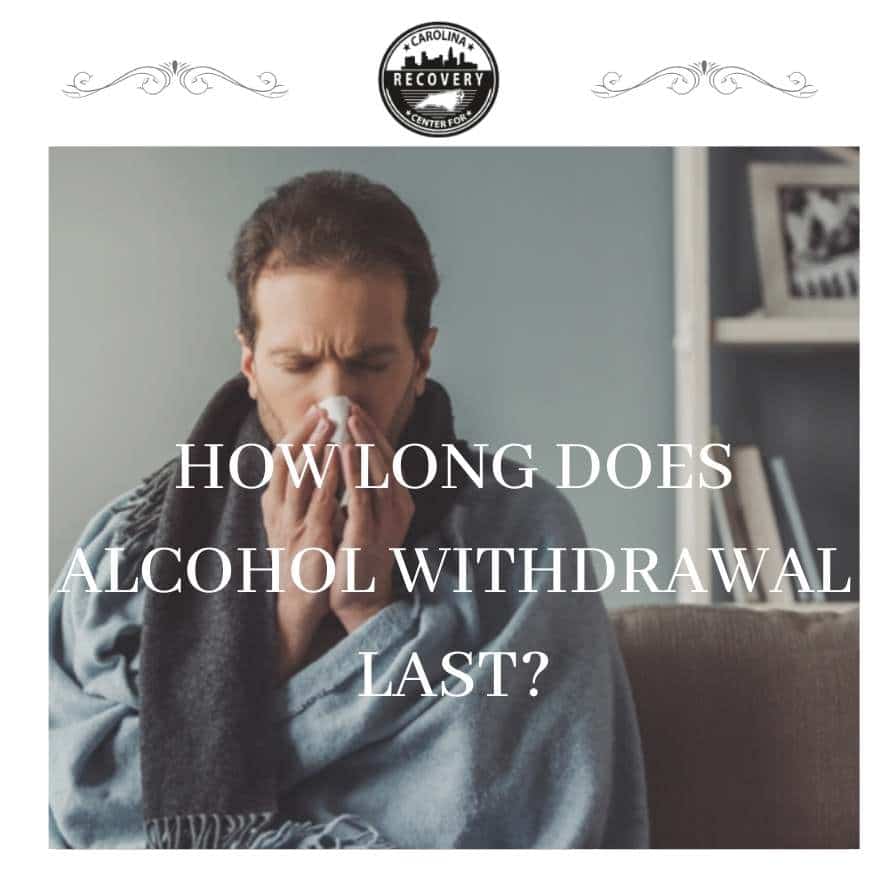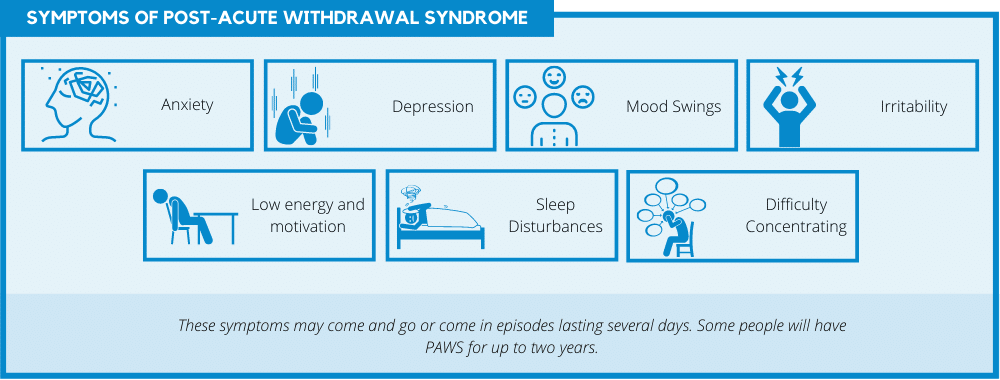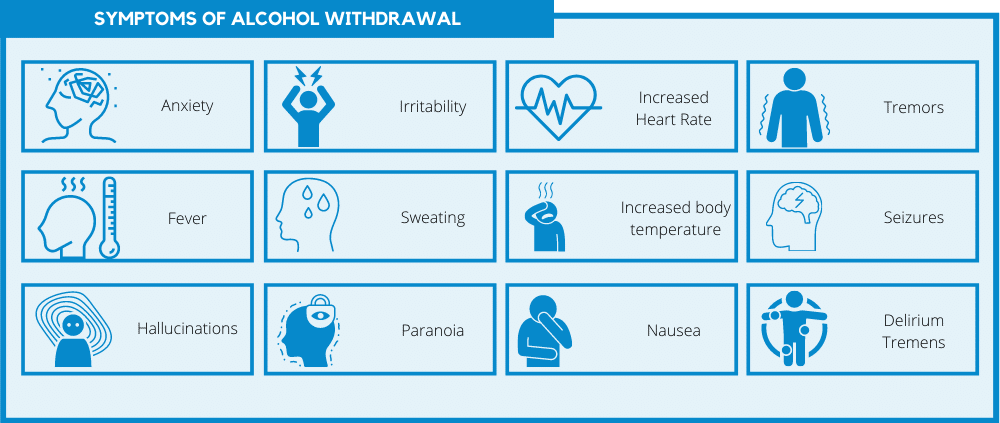How Long Does Alcohol Withdrawal Last?

Medically Verified: 2/1/24
Medical Reviewer
Chief Editor

All of the information on this page has been reviewed and verified by a certified addiction professional.
Quitting drinking is certainly scary, especially if you are expecting to go into withdrawal. How long alcohol withdrawal lasts depends on a variety of factors, such as how long you’ve been drinking, how often you drink, and whether or not you’ve gone through withdrawal before.
Most people will start having symptoms within the first 6-12 hours after their last drink. Symptoms will progressively get worse for a few days, peak around 72 hours, and subside after about a week. However, that doesn’t mean you’ll be completely done with alcohol withdrawal after 7 days – for some, lingering withdrawal symptoms can be a nuisance for up to two years.
Alcohol Withdrawal Timeline

To better understand how long alcohol withdrawal lasts, let’s look at the timeline of what you can expect during withdrawal.
The alcohol withdrawal timeline can be broken down into two stages. The first stage consists of the most serious physical withdrawal symptoms that occur within the first hours, days, and weeks after you stop drinking.
The second stage is referred to as post-acute withdrawal syndrome (PAWS). PAWS are the emotional and psychological symptoms you may experience for months or even years after quitting drinking.
The length of time symptoms last and how severe they become depends heavily on how much you drink, how long you’ve been drinking, and other health factors. Overall, the worst of your symptoms should subside after 72 hours, but you may experience PAWS for up to two years.[1]
Here is a general timeline of what you can expect during alcohol withdrawal.
6-12 Hours
Most people will begin experiencing minor withdrawal symptoms after 6 hours without drinking. The longer you’ve been addicted to alcohol and the more your body is used to drinking, the faster your symptoms will begin.
Between hours 6 and 12, you may experience headaches, anxiety, insomnia, loss of appetite, and alcohol cravings. These symptoms will continue to progress as time goes on, however, they are not severe at this point in time.
12-24 Hours
After 12 hours, a small percentage of people may experience hallucinations. Hallucinations may be tactile, auditory, or visual. Those who do not experience hallucinations will have worsening symptoms of anxiety, insomnia, sweating, and high blood pressure.
If you are a heavy drinker, you may be a seizure-risk during this time period. You can minimize your risk of a seizure by detoxing in a medical facility with around-the-clock care.
24-48 Hours
Minor withdrawal symptoms will continue to worsen between 24 and 28 hours. You may have a bad headache, body tremors, and an upset stomach.
If you are a mild to moderate drinker, your symptoms may peak during this timeframe. However, if you are a heavy drinker, you can expect your symptoms to progress. Seizures continue to be a significant risk to heavy drinkers who are detoxing.
48-72 Hours
People who are experiencing severe alcohol withdrawal may suffer delirium tremens (DTs) between 48 and 72 hours after their last drink. If you have been drinking for a long time or have co-occurring health conditions, you may be at risk for DTs.
DTs consist of rapid heart rate, high body temperature, delusions, and seizures.
72+ Hours
Around 72 hours, or three days, most heavy drinkers will experience the worst of their symptoms. Mild drinkers, on the other hand, may see their symptoms improve around this time. Other alcohol withdrawal symptoms, such as anxiety, depression, and cravings can last for several weeks or months after you stop drinking.
Post-Acute Withdrawal Syndrome (PAWS)
The vast majority of people who go through alcohol withdrawal suffer from PAWS. Symptoms of PAWS include:

- Anxiety and depression
- Mood swings
- Irritability
- Low energy and motivation
- Sleep disturbances
- Difficulty concentrating
These symptoms may come and go or come in episodes lasting several days. Some people will have PAWS for up to two years.
The best way to cope with PAWS is to work with a substance abuse treatment counselor to develop useful coping strategies.
Symptoms of Alcohol Withdrawal
Alcohol is a central nervous system depressant that changes the way receptors in the brain produce chemicals and transmit signals. Long term alcohol abuse causes permanent changes that can only recover through abstinence.
When you suddenly stop drinking, your brain and body need time to adjust and repair the changes made in the brain. This adjustment period is when withdrawal symptoms occur.
During alcohol withdrawal, your nervous system is overly active, producing symptoms like:

- Anxiety and irritability
- Nausea
- Increased heart rate
- Tremors
- Fever
- Sweating
- Increased body temperatures
- Seizures
- Hallucinations
- Paranoia
- Delirium tremens
Doctors estimate that 50% of people with alcohol use disorder have withdrawal symptoms when they stop drinking. Anywhere between 3-5% of people will suffer severe symptoms.[2]
Factors That Influence How Long Alcohol Withdrawal Lasts
There are many individual factors that influence how long it takes you to detox from alcohol. These same factors are the ones used by doctors at detox centers so they can estimate how long withdrawal will last and how severe your symptoms may become. These include:[3]
- Poor liver health
- History of severe alcohol withdrawal symptoms
- Low sodium or potassium levels
- Low blood platelet counts
- Older age when going through withdrawal
- Dehydration
- Using other drugs while drinking alcohol
- More frequent and longer alcohol abuse
If you identify with any of these factors, you may expect more severe and long-lasting withdrawal symptoms.
Regardless of your situation, it’s impossible to predict exactly how long alcohol withdrawal lasts. The truth is that alcohol detox is an unpredictable and potentially life-threatening condition that requires professional help.
Find an Alcohol Detox Center Today
At Carolina Center for Recovery, we offer drug and alcohol detox programs that can help you stay safe and comfortable while you detox. We can administer medications, offer counseling and support, and teach you natural ways to make the withdrawal process easier. Call now to learn more about alcohol rehab.
References:

